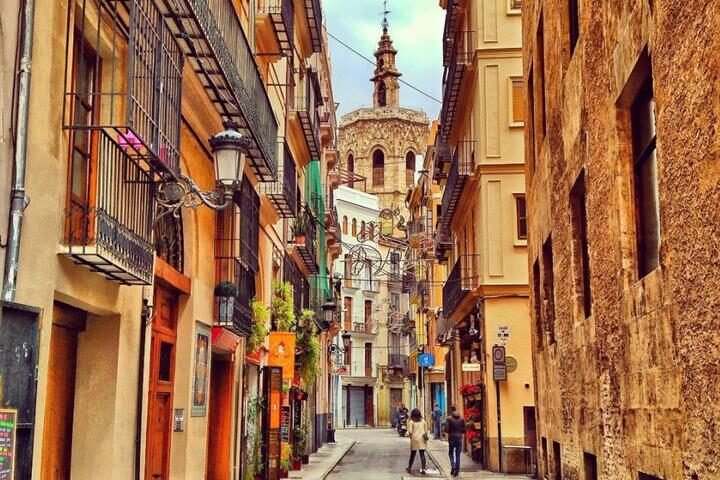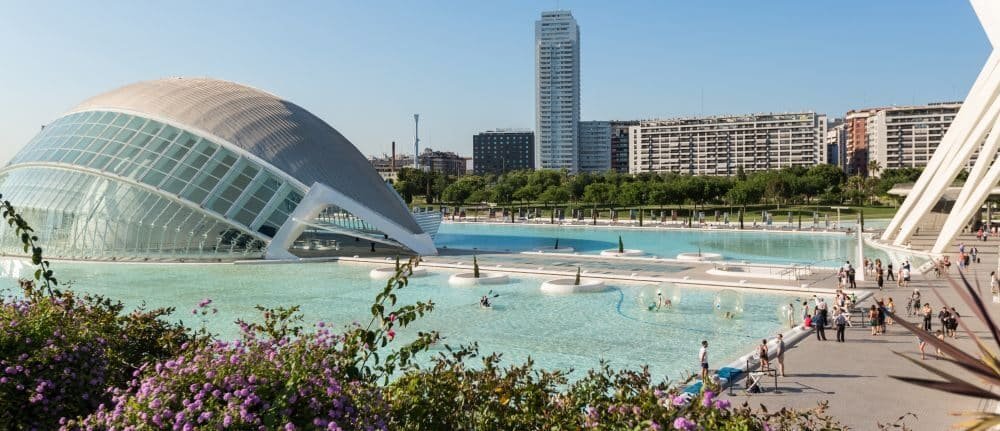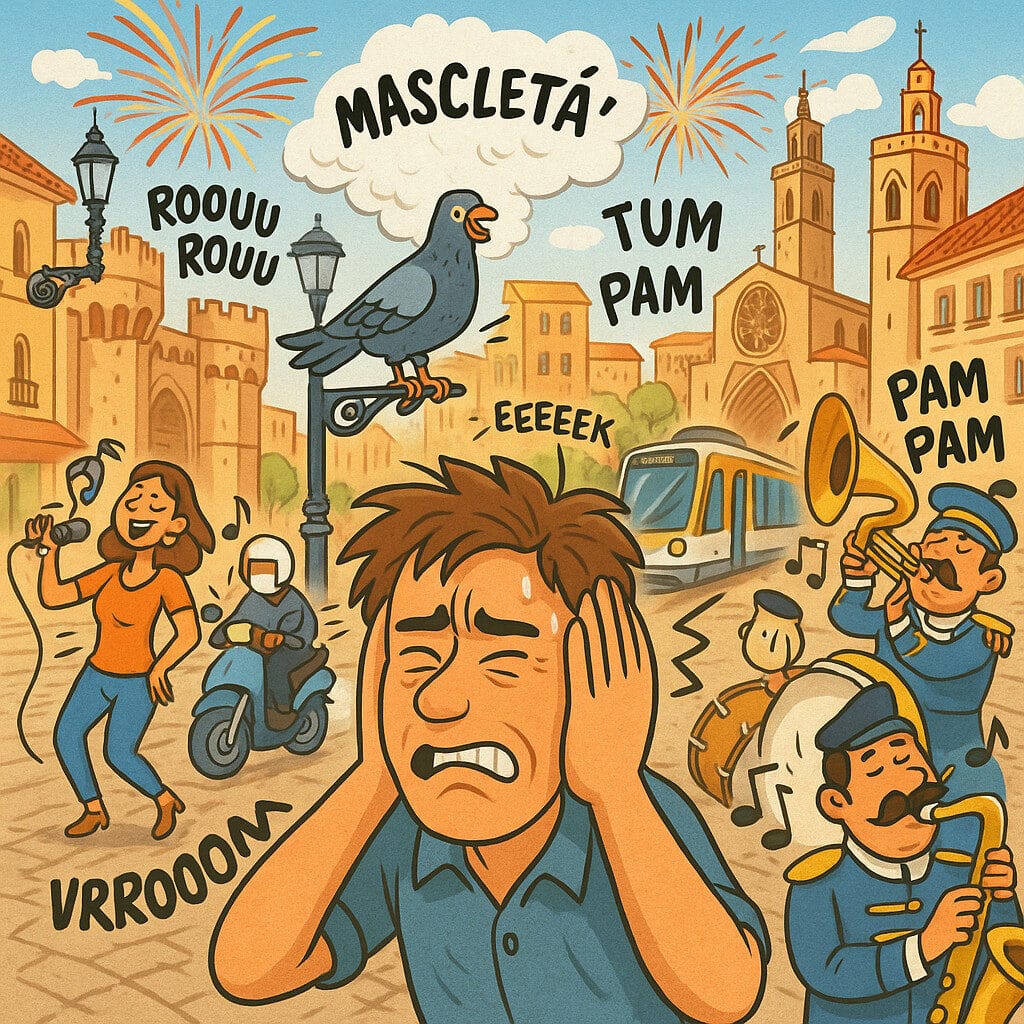A Charming City of Contrasts Where Sun-Soaked Beauty Meets Urban Reality
So you’re dreaming of living in Valencia?
Those Instagram photos of palm trees, pristine beaches, and stunning architecture have you convinced this is paradise on Earth? Well, grab a horchata and let me share some “inconvenient truths” about life in this Mediterranean jewel.
Don’t worry – like a good paella, every seemingly negative ingredient adds to the final flavor.
The Symphony of Noise (and Poor Insulation)

Remember those charming Spanish buildings you’ve been eyeing? Those elegant facades with their ornate balconies and traditional tiles? Well, they’re essentially sophisticated tambourines. The insulation is so poor that you’ll become intimately familiar with your neighbors’ lives – whether you want to or not.
Every conversation, every TV show, every late-night phone call becomes a shared experience.
And then there’s Fallas. Ah, Fallas!
For one month, the city transforms into what can only be described as a war zone of celebration.
Imagine waking up to explosions at 8 AM (the traditional “despertà”), followed by random fireworks throughout the day, culminating in evening mascletàs that make your windows rattle like they’re trying to escape. Your pets will think the apocalypse has arrived, and they’ll be hiding under the bed from March 1st to March 20th.
But here’s the silver lining: these thin walls and festive chaos create a unique form of community.
You’ll never feel alone (literally – you can hear everything), and you’ll develop an impressive ability to sleep through almost anything.
Plus, you’ll get front-row seats to some of the most spectacular fireworks displays in Europe, all from your poorly insulated balcony!
The Urban Obstacle Course
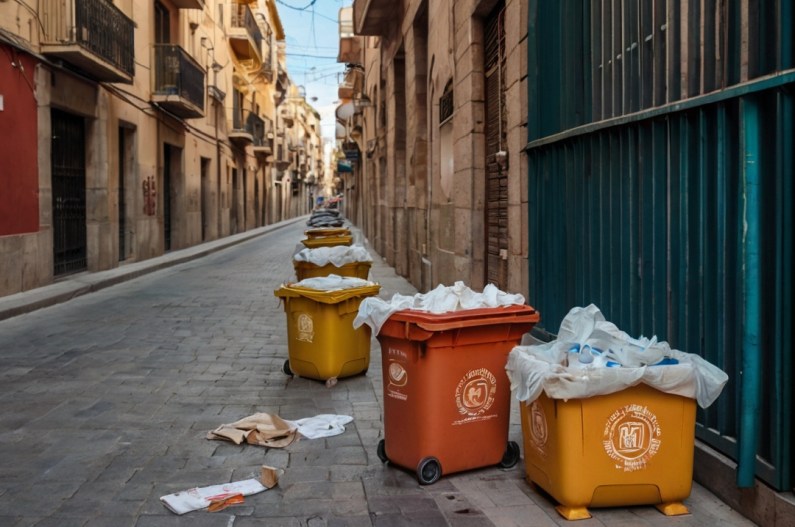
Let’s talk about the streets.
Oh, the streets! Walking through Valencia can feel like participating in an obstacle course designed by a mischievous urban planner.
First, there’s the dog deposits – apparently, some local pet owners believe their furry friends are contributing to urban fertilization. Then there’s the mysterious puddles that appear in the early morning hours (spoiler alert: not all are from rain).
The graffiti artists seem to operate on the principle that every clean wall is a blank canvas begging to be “enhanced.”
Some tags are actually quite artistic, while others look like someone sneezed while holding a spray can.
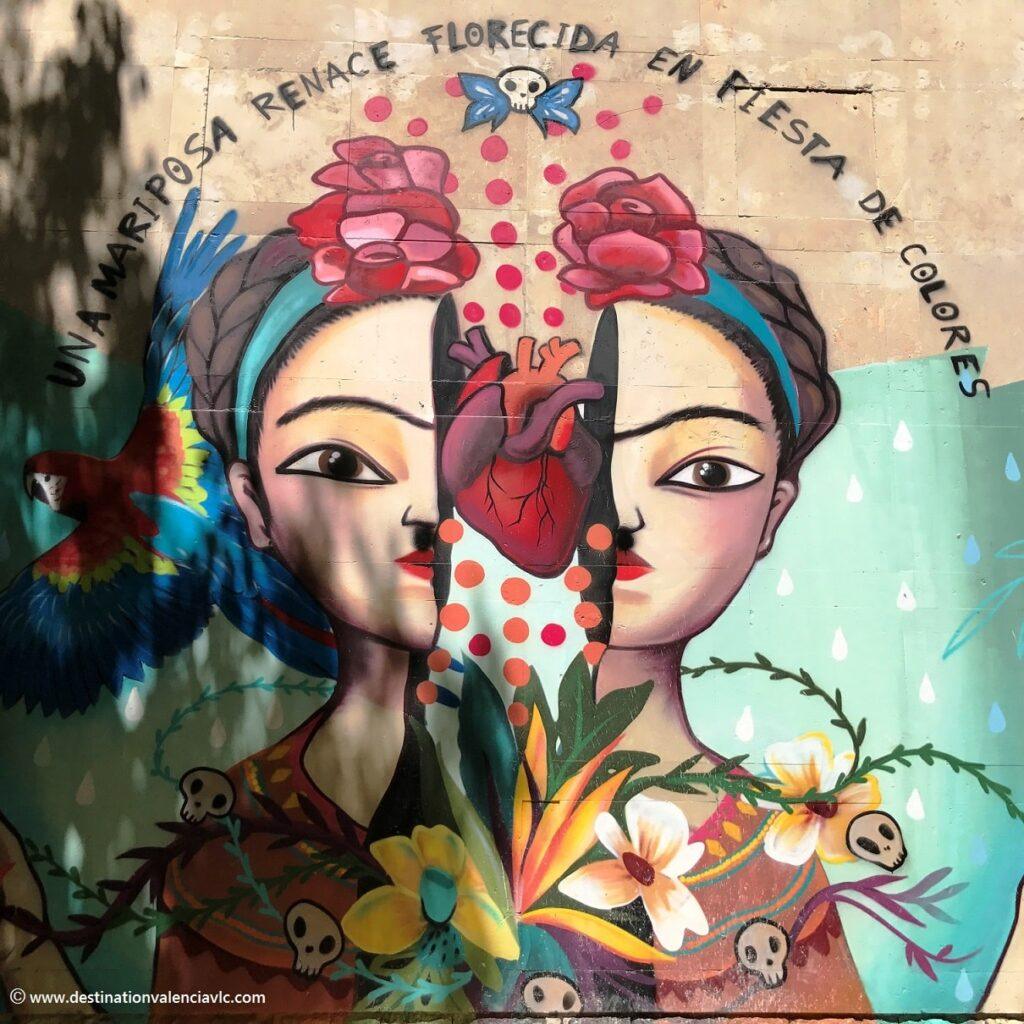
And let’s not forget the creative litterers who justify their actions with the philosophical argument that they’re “providing job security” for street cleaners.
However, this has led to Valencia having one of the most impressive street cleaning operations in Spain.
The street cleaners are basically local celebrities, known by name in their neighborhoods.
They’re out there every morning, erasing the evidence of the previous night’s urban adventures. The city is like a giant Etch A Sketch, reset daily.
The Job Hunt Safari

Looking for work in Valencia? Hope you enjoy sending CVs into the void! Unless you’re in tech, tourism, or have a particular set of very specific skills, the job market can feel about as welcoming as a vegetarian at a paella contest.
Salaries often make you wonder if there’s been a decimal point error in your contract (spoiler: there hasn’t), and competition for good positions is fiercer than the August heat.
The silver lining? This challenging environment has created a remarkably resilient and creative workforce. Everyone seems to have a side hustle or an innovative project brewing. The difficult job market has fostered a strong entrepreneurial spirit, and co-working spaces are popping up faster than churro stands.
Plus, the lower salaries mean a less materialistic lifestyle – you’ll quickly learn that happiness isn’t about how much you earn but how many long lunches you can enjoy with friends.
The Language Labyrinth
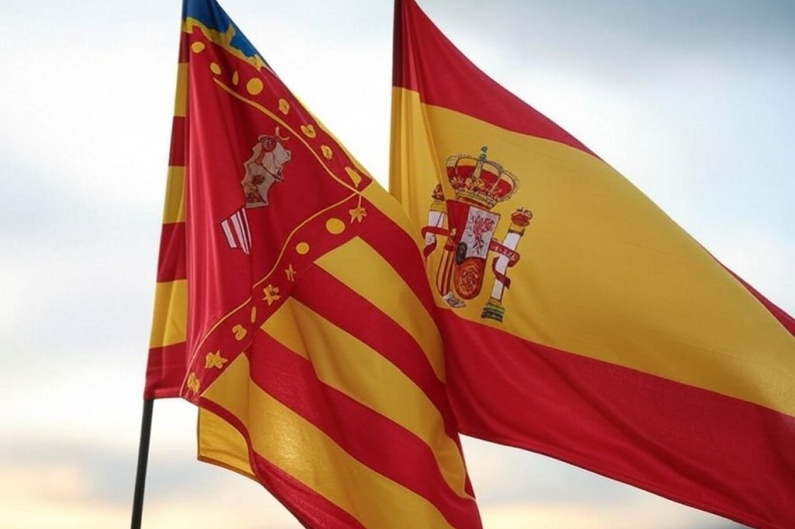
Got kids? Welcome to the linguistic jungle! Public schools primarily teach in Valencian, which might come as a surprise if you thought moving to Spain meant your children would be learning in Castellano (Spanish).
It’s like ordering a paella and getting fideuà – still delicious, just not what you expected.
The school infrastructure might remind you of your own school days… from several decades ago.
And forget about choosing your preferred school – the system has its own mysterious ways of allocation that seem to involve complex algorithms and possibly some form of ancient astrology.
But here’s the bright side: your children will become trilingual without even trying.
They’ll switch between Valencian, Castellano, and English with the ease of a traffic light changing colors (though with more consistency).
This linguistic gymnastics will give them cognitive advantages and make them more adaptable than a Swiss Army knife.
The Local Connection Challenge
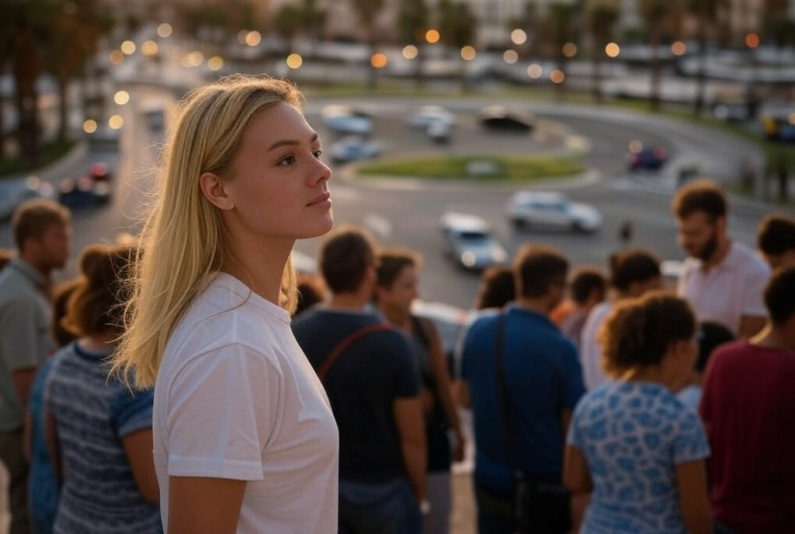
Valencians are like a close-knit club with a waiting list longer than the queue for the City of Arts and Sciences on a rainy Sunday.
They’re people of habit, deeply rooted in their family traditions and social circles that have been cultivating since the Roman times (or at least it feels that way).
Initially, they might view foreigners with the same suspicion they reserve for people who put chorizo in paella.
There’s often a perception that newcomers are responsible for rising housing prices and the “turistification” of traditional neighborhoods.
Getting invited into local social circles can feel harder than finding a parking spot in El Carmen.
However, once you’re “in,” you’re family. Like, actual family.
They’ll invite you to their grandmother’s birthday, their cousin’s wedding, and their nephew’s first communion.
They’ll share their secret family recipes, introduce you to their favorite hidden bars, and defend you as one of their own.
The initiation period might last decades, but the loyalty is eternal.
Traffic: Where Traffic Rules Are More Like Guidelines, Really
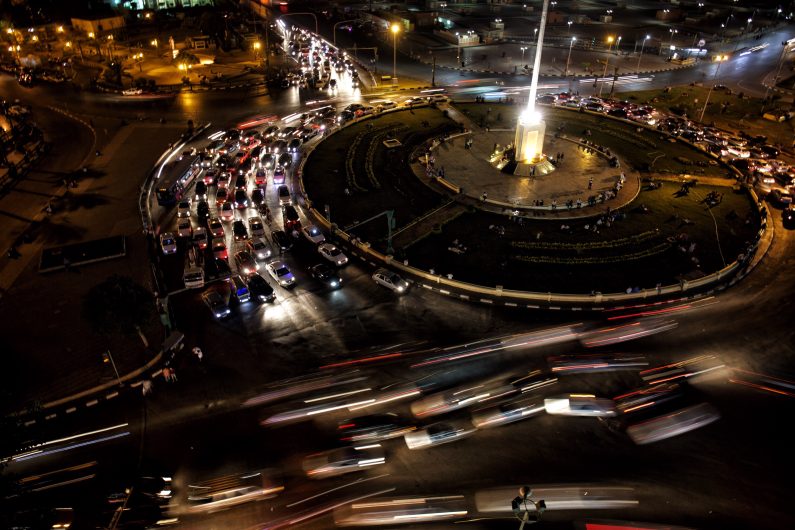
Whoever designed Valencia’s traffic system must have been a fan of puzzle games and adrenaline sports, with a dash of abstract expressionism thrown in for good measure.
The city is blessed with traffic lights that seem to operate on their own unique temporal logic.
Sometimes they’re so perfectly mistimed that you’ll wonder if they’re actually art installations commenting on the futility of urban planning.
The roundabouts deserve special mention – places like Plaza de España aren’t so much traffic circles as they are automotive gladiatorial arenas.
Local drivers approach them with a combination of fatalism and bravado that would make a stunt driver nervous.
The basic rule seems to be: hesitate, and you’re lost forever, circling like a metallic electron in an urban atom.
The cycling situation tells its own fascinating tale of transformation.
Once an extremely car-centric city, Valencia has made admirable strides toward becoming more bike-friendly, though not without its quirks.
The new bike paths, while welcome, tend to be rather narrow affairs, creating interesting encounters between cyclists, lightning-fast e-scooters, and pedestrians who sometimes treat bike lanes as optional pavement extensions. It’s rather like a continuous improvised dance where not everyone knows the choreography.
However, there are silver linings.
The chaotic traffic has made the city’s growing network of bike lanes feel like sanctuaries of tranquility – when they’re not being inadvertently invaded by wandering pedestrians, that is.
The crown jewel is undoubtedly the Turia Gardens, where you can navigate 50-85% of your journey through the city entirely car-free.
Yes, it might feel like a cycle-based version of dodgem cars during peak hours, but at least you won’t end up in a tangle with a motor vehicle.
The upside? You’ll develop supernatural defensive driving skills, whether on four wheels or two.
After a few months of navigating Valencia’s traffic, you could probably parallel park on the edge of a cliff during a hurricane or thread a bicycle through a crowd with the precision of a neurosurgeon.
Plus, there’s a growing number of bike-priority streets where cycles can take up the entire road, and motorists must patiently follow behind – a small victory for pedal power.
The best part?
The situation improves daily as more locals and visitors embrace cycling, and everyone gradually adapts to sharing the road. It’s like watching a city learn to dance – there might be a few stepped-on toes along the way, but eventually, everyone finds their rhythm.
Traffic Lights: A City-Wide Light Show with High Stakes
Valencia boasts roughly 1,100 sets of traffic lights – apparently the second-highest density in the world after New York City, working out to one traffic light per 705 residents.
The timing of these lights, however, seems to have been programmed by someone with a rather wicked sense of humour.
The pedestrian green light’s warning blink is particularly memorable – giving you approximately two seconds to transform into Usain Bolt if you’re caught mid-crossing.
Spain’s unique flashing amber system adds an extra dash of excitement to every crossing.
Picture this: you’ve got a green pedestrian light, while cars face a flashing amber – which technically means “proceed with caution” but is often interpreted as “floor it before it turns red.”
This charming quirk makes Valencia the only European country where you can have a green walking signal while cars still have permission to move – a setup that’s raised more than a few safety concerns.
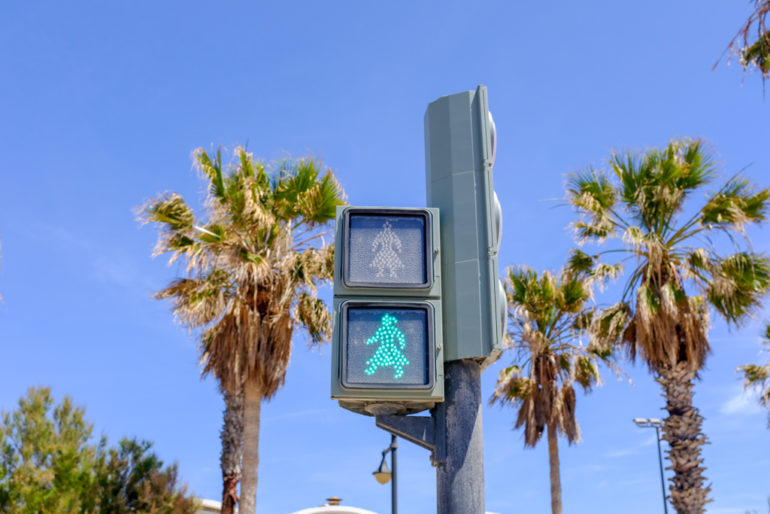
On a more positive note, Valencia made headlines in 2016 by introducing female figures on their traffic lights.
While there was some debate about representing women in dresses (because apparently trousers hadn’t been invented yet), the initiative was part of a broader effort to make women more visible in urban spaces.
The city cleverly implemented this change during planned LED upgrades, proving that sometimes progress doesn’t need to cost extra.
Between the sprint-inducing countdown system and the ambiguous amber lights, crossing the road in Valencia is rather like participating in an urban version of “Frogger” – albeit one with more inclusive traffic light figures.
Petty Crime: A Constant Game of “Mind Your Belongings”
While Valencia ranks among Europe’s safest cities for serious crime, it’s developed quite the reputation for petty theft – rather like a pickpocket’s finishing school.
The city’s growing tourist crowds have attracted an enterprising community of light-fingered opportunists who view unattended phones and dangling handbags as open invitations.
Mobile phones are particularly coveted – the classic “snatch and run” from café tables has become something of a local sport.
And bicycles? Well, let’s just say that investing in anything less than two heavy-duty locks is essentially making a donation to the local theft economy.
Even then, it’s wise to consider your beloved bike more as a temporary companion than a life-long friend.
The most targeted areas? Predictably, it’s wherever tourists congregate: the beach promenade, Plaza de la Reina, around the Central Market, and especially the crowded terraces where people carelessly hang bags on chair backs or leave phones on tables.
The Turia Gardens, despite its idyllic atmosphere, has become a favourite hunting ground – those lazy Sunday picnics can quickly turn sour when you realise your bag has vanished while you were passing the sangria.
The thieves are remarkably skilled – you might not even notice your belongings have gone walkabout until long after they’ve disappeared.
Yet it’s worth noting that violent crime remains remarkably low.
These aren’t threatening confrontations – rather, they’re exercises in stealth and opportunity.
The best defence? Channel your inner paranoid: keep your belongings close, your phone closer, and maybe consider that third bike lock after all.
Dogs Rule the City (Sometimes a Bit Too Much)
Valencia’s relationship with its four-legged residents is rather complex.
The city seems to have a dog in every other household, often in situations that might raise eyebrows elsewhere – like large breeds sharing modest flats with their owners, or retirees acquiring energetic puppies for companionship.
The social aspect is brilliant.
While dogs engage in their customary greetings, you’ll find yourself drawn into delightful conversations with fellow owners, often blossoming into friendships sealed with a warm “¡Hasta luego!” – connections that might never have formed without your canine social secretary.
However, not everything in this doggy paradise is rosy.
The issue of dog mess has been a persistent challenge.
While owners are now required to clean up and carry water-vinegar solutions to dilute urine (a relatively recent development), some areas still resemble an obstacle course.
Picture the lovely aroma during August’s 45-degree heatwave, and you’ll understand why this matters.
Then there’s the peculiar phenomenon of balcony dogs – pooches left to while away their hours on tiny terraces, providing the neighbourhood with an unsolicited canine chorus.
Curiously, most locals seem unfazed by this constant barking, having developed the same selective hearing that helps them sleep through midnight fireworks.
As of 2025, the city has stepped up its game with new regulations: mandatory insurance for all dogs, required training courses for owners, and fines ranging from €500 to €200,000 for non-compliance.
It’s rather like getting a driver’s licence for dog ownership – complete with theory tests and insurance requirements.
The Climate Conundrum
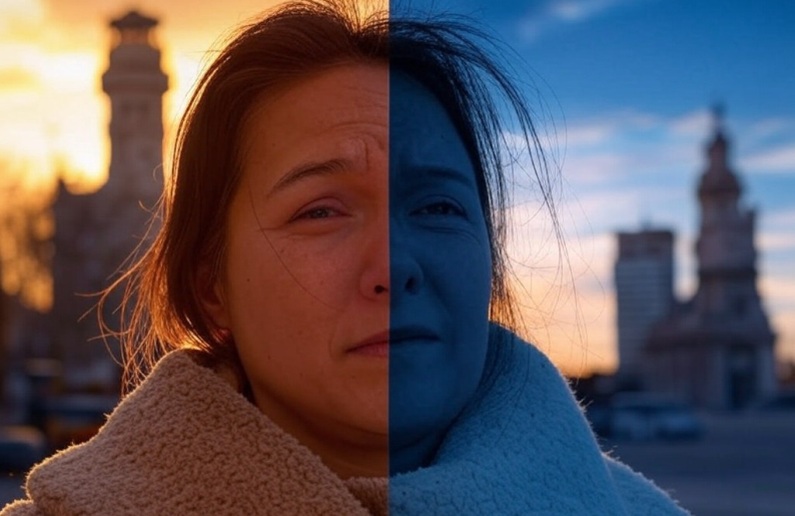
Summer in Valencia is like living in a terracotta oven set to “Mediterranean max.”
The heat isn’t just hot – it’s a presence, a force that transforms the city into a slow-motion movie where everyone moves from shade to shade like solar-phobic ninjas.
And remember those poorly insulated buildings? They’re excellent at storing heat, turning your apartment into a sauna that runs 24/7.
Winter, contrary to what the travel brochures suggest, exists.
It’s not the bone-chilling cold of Northern Europe or the USA or Canada, but rather a damp, penetrating chill that seems to bypass clothing entirely and settle directly into your bones.
Those same buildings that kept you roasting in summer now feel like they’re actively importing humidity.
But this explains why everyone looks so good – we’re basically slow-cooking ourselves to perfection year-round.
Plus, the climate has created a culture of outdoor living that’s enviable.
Even in winter, you’ll find people enjoying terrace cafes, wrapped in blankets provided by thoughtful restaurant owners.
The Bureaucratic Ballet: Where Logic Goes to Holiday

Ah, bureaucracy – the true national sport of Spain.
Getting paperwork done in Valencia requires the patience of a saint, documentation that would rival the British Library, and stamina that would make an ultramarathon look like a gentle stroll in the park.
You’ll quickly find yourself caught in a rather brilliant catch-22: you need a NIE (your Spanish ID number) to open a bank account, but – splendid irony – you need a bank account to get your NIE!
And scoring an appointment?
That’s a bit like winning the lottery, though rumour has it that clicking refresh at precisely 8 am on a Friday might improve your odds.
Personal note: One does wonder if this labyrinthine system isn’t perhaps designed to nudge us towards the services of a gestor (a Spanish bureaucratic wizard), who can mysteriously materialise appointments faster than you can say “otra vez?”
Everything moves at the speed of a siesta-taking snail, and each official seems to have their own interpretation of what documents you need.
Though, interestingly, our Latin American friends have a smoother sailing – former colonial ties mean their documents are already in Spanish, and various agreements fast-track their paperwork. (Yes, we’re a tad envious.)
However, this bureaucratic maze has created some unexpected benefits.
You’ll develop zen-like patience and master the art of creative problem-solving.
The complex systems have fostered a brilliant culture of mutual aid, where experienced expats guide newcomers through the administrative labyrinth.
Plus, once you’ve successfully navigated Spanish bureaucracy, everything else in life seems remarkably straightforward.
The Final Verdict
Valencia isn’t perfect.
But neither is any city.
What makes it special is how these “flaws” weave into its character, creating a place that’s genuinely unique.
Before moving here, understand that you’re not just relocating to a city – you’re adopting a lifestyle, complete with its quirks and charms.
If you can embrace the chaos, learn to love the late lunches, accept that time is more of a suggestion than a rule, and understand that relationships matter more than efficiency, you might just find yourself falling in love with this imperfect paradise.
Just don’t expect anything to happen quickly… except maybe those roundabout encounters!
Remember, the best things in life aren’t perfect – they’re authentic.
And Valencia, with all its flaws and foibles, is nothing if not authentic. Just make sure to bring earplugs, patience, and a sense of humor.
You’re going to need them all!


